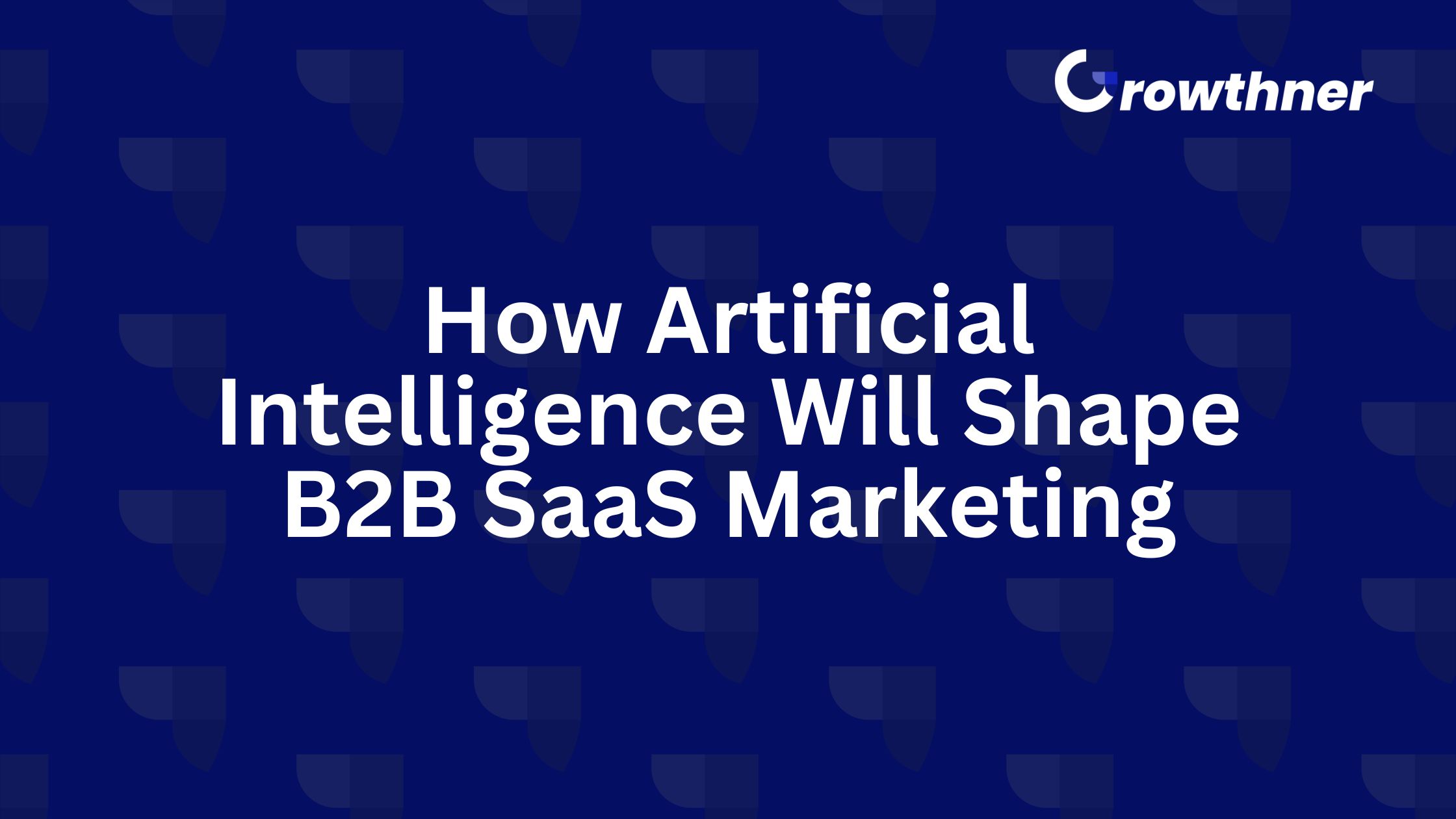Get a Free SEO
Growth Plan
Actionable insights tailored for your business
Apply now
Published by: Amit Kakkar
Published on: October 19, 2023
Last updated on: January 22, 2026
Last Updated on January 22, 2026 by admin
In a world where artificial intelligence is quickly becoming an indispensable part of our daily lives, its integration into B2B SaaS marketing is no exception. From music recommendations on Spotify to self-driving cars and personalized movie suggestions on Netflix, AI has permeated various aspects of our lives.
Moreover, the use of AI tools such as ChatGPT, Jasper, and Bard underscores its growing importance in many companies technology stacks.
According to Forbes, “The global artificial intelligence market is anticipated to experience remarkable growth, with a projected compound annual growth rate (CAGR) of 37.3% between 2024 and 2030. This growth trajectory is expected to culminate in a market size of $1,811.8 billion by 2030.”
Big and small organizations across the globe are harnessing the power of AI to remain competitive, enhance profitability, and expand their market share. Enterprise software companies like Box, HubSpot, and Salesforce are also integrating AI tools into their products, recognizing the need to stay relevant in the digital age.
As we witness this profound AI revolution, it is crucial to understand how artificial intelligence will shape B2B SaaS marketing. This blog will delve into the pivotal ways AI is revolutionizing the B2B SaaS marketing sphere.
These AI-driven changes are not only reshaping marketing practices but are also becoming increasingly essential for businesses looking to stay competitive and meet their customers’ evolving expectations in the digital age.
In the realm of B2B SaaS marketing, personalization is king. Artificial intelligence takes this to a whole new level. By analyzing customer data and behavior, AI can tailor marketing content, product recommendations, and interactions to suit each individual’s specific preferences and needs.
AI can analyze a customer’s past interactions with a website, emails, or products and use this data to recommend relevant content or products.
For instance, think of how Netflix recommends movies and shows based on your viewing history. In B2B marketing, this means personalized email campaigns that address recipients by name, offer content relevant to their interests and understand their pain points. This level of personalization greatly enhances customer engagement and satisfaction.
Drawing insights from historical data and employing machine learning algorithms, predictive analytics empowers businesses to peer into the future, anticipating customer needs and behavior with uncanny accuracy.
This transformative capability serves as the linchpin for tailored marketing efforts, the foresight to predict market demands, and the wisdom to make informed decisions regarding product development and allocation of marketing budgets.
Traditionally, the process of lead scoring was a manual, labor-intensive endeavor, fraught with subjectivity. However, AI has revolutionized this sphere. AI-driven lead scoring is an automated, data-backed process that evaluates lead data and behavior to rank prospects meticulously according to their likelihood of conversion.
This meticulous approach enables sales and marketing teams to zero in on high-value leads, significantly increasing conversion rates and, by extension, overall revenue.
Data analysis is the backbone of effective marketing. AI simplifies this process by rapidly identifying trends and insights in enormous datasets that might be impractical for humans to handle manually. The result is more effective and data-driven decision-making.
For example, AI can analyze the performance of social media campaigns across various platforms, dissecting metrics to evaluate the impact of each post or advertisement. This analysis aids marketers in pinpointing which strategies are most effective, helping them allocate their resources wisely to achieve the best possible results.
Moreover, AI has the capacity to monitor and scrutinize data related to competitors, providing B2B marketers with the tools to maintain an advantageous position in a fiercely competitive environment. With these invaluable insights at their disposal, businesses can craft strategic decisions that propel them ahead of the competition.
AI is becoming an indispensable assistant in content marketing. It can generate, curate, and distribute content efficiently. It can customize marketing content by analysing customer data for specific target audiences.
Consider email marketing. AI can craft personalized email campaigns that address recipients by name and recommend products or services based on their past interactions with the company.
This not only saves time but also ensures that the content is highly relevant to the recipient, increasing the chances of engagement and conversion.
AI-powered chatbots and virtual assistants have revolutionized customer support. They act as digital representatives of a business, providing immediate assistance and information. These AI-driven agents can understand and respond to customer inquiries accurately and consistently, 24/7.
This level of customer support significantly enhances user satisfaction and engagement. Businesses can provide quick solutions to customer queries, improving their overall experience and loyalty. Chatbots are now common in B2B marketing, ensuring that customer interactions are efficient and effective.
Digital transformation is about moving a business’s processes and interactions into the digital realm. AI plays a pivotal role in this transformation by optimizing internal operations and enhancing customer interactions.
AI can automate routine tasks, allowing employees to focus on more strategic and value-added work. Additionally, it enables highly personalized communication with customers and offers 24/7 support through chatbots and virtual assistants, enhancing overall customer satisfaction.
In a world increasingly reliant on AI, B2B SaaS SEO agencies and companies should proactively adopt and harness AI to stay ahead of the competition. The benefits are very evident. However, to fully leverage the power of AI in B2B SaaS marketing, companies must be prepared to invest in AI tools and cultivate the necessary skills within their teams.
Those who adapt swiftly and strategically will be the leaders in this new era of AI-driven marketing, maximizing their profitability and market share. As the AI market surges toward an estimated $2 trillion valuation by 2030, the time to embrace AI in B2B SaaS marketing is now.
Amit Kakkar